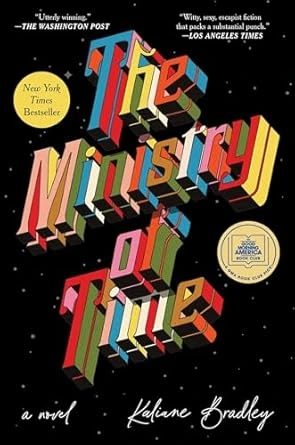Introduction to The Ministry of Time
Time travel novels are nothing new—but Kaliane Bradley’s The Ministry of Time has taken the literary world by storm. Combining romance, espionage, and sharp social satire, this debut novel offers something fresh for both science fiction and literary readers.

What Makes This Debut Novel Stand Out
Unlike traditional time travel stories focused on paradoxes or futuristic gadgets, The Ministry of Time explores the human side of displacement, love, and power. It’s a spy thriller, a workplace comedy, and a deeply emotional romance all in one.
Quick Background on Author Kaliane Bradley
Kaliane Bradley is a British-Cambodian writer whose unique perspective on identity and belonging deeply informs the novel. Her cultural insights bring richness to the themes of colonialism, history, and personal identity woven throughout the book.
The Ministry of Time Book Summary
The Premise: A Government Experiment with Time Travel
At the heart of the story lies the Time-Door Project, a secretive government initiative.
The Time-Door Project Explained
The Ministry of Time creates portals to different eras. Instead of changing history, they rescue people—called “expats”—from the exact moment they were supposed to die. This ensures history remains intact while giving the Ministry valuable “subjects.”
Why the Ministry Saves People at the Moment of Death
By intervening at the brink of death, the Ministry avoids altering timelines. It’s a clever narrative device that allows historical figures to exist in modern Britain without paradoxes.
Meet the Expats: Characters Pulled from History
The expats are plucked from history, each facing cultural shock as they adapt to modern life.
Commander Graham Gore – From the Franklin Expedition
Perhaps the most central expat, Gore was a real-life 19th-century naval officer who perished in the Arctic. In the novel, he survives through the Ministry and becomes a romantic interest for the narrator.
A Plague-Era Woman (1665)
Pulled from the time of the Great Plague in London, she represents resilience and the clash of medieval attitudes with modern science.
A Civil War Lieutenant
His presence brings a perspective shaped by political upheaval and loyalty.
A Somme-Era Captain
From the brutality of World War I, he highlights trauma and the psychological scars of war.
The Bridge and Commander Gore: A Love Story Across Centuries
How the Relationship Begins
The unnamed narrator, known as “the bridge,” is assigned to help Gore adjust to the modern world. What begins as professional duty turns into emotional intimacy.
Cultural and Emotional Clashes
Gore’s Victorian values often collide with the narrator’s modern perspective, creating both humor and tension.
Romance in a World of Secrets
Despite secrecy, surveillance, and cultural divides, their relationship blossoms, showing how love can transcend time.
The Ministry’s Secrets and the Final Twist
Surveillance and Espionage Within the Agency
The Ministry closely monitors expats and bridges, raising questions about power, control, and state secrecy.
The Revelation of Adela as the Future Self
A shocking twist comes when the narrator discovers her handler, Adela, is actually her own future self—forcing her to confront destiny and choice.
The Sabotage and the Fate of the Expats
The time-door is sabotaged, leaving uncertain futures. Some expats escape, while others vanish into history. The story ends with a haunting yet hopeful photograph that suggests survival and freedom.
Main Characters in The Ministry of Time
The Narrator (The Bridge)
Her Cambodian-British Identity
Her mixed heritage informs her role as a cultural mediator between past and present, echoing themes of diaspora and belonging.
Role as a Cultural Mediator
She translates modern Britain for Gore, while also reflecting on her own place in society.
Commander Graham Gore
His Victorian Values and Worldview
Gore embodies stoicism and duty but gradually softens as he navigates the modern era.
Adaptation to the Modern World
His struggle with modern norms—technology, gender roles, and identity—provides both humor and poignancy.
Other Historical Expats
Shared Struggles in Adjusting to Modern Times
Each expat faces cultural dislocation, symbolizing the immigrant experience in a metaphorical sense.
Adela (the Future Self)
Her Role in the Ministry
As a handler, she guides the narrator while concealing her true identity.
The Ethical Paradox of Her Decisions
Her existence raises questions about free will, morality, and sacrifice.
Themes Explored in The Ministry of Time
Love and Belonging Across Time
How Romance Defies Historical Boundaries
The romance between Gore and the narrator shows that love transcends culture and era.
Emotional Growth of Both Characters
Their relationship forces each to evolve—Gore becomes more open, while the narrator reconsiders destiny.
Colonialism, Identity, and Cultural Displacement
Postcolonial Echoes in the Narrator’s Journey
As someone of Cambodian heritage, the narrator’s perspective mirrors historical exploitation and adaptation.
Power Dynamics Between Past and Present
The Ministry’s control over expats reflects how modern powers exploit marginalized groups.
Government Control, Surveillance, and Morality
How the Ministry Reflects Real-World Politics
The agency’s secrecy parallels real surveillance states and government experiments.
The Question of Who Controls Time
Bradley asks: who decides whose lives are worth saving?
Humor, Satire, and Dark Undercurrents
The Comic Tone vs. The Spy-Thriller Elements
Lighthearted culture clashes mask deeper themes of espionage and power.
How Bradley Balances Light and Dark
The novel keeps readers entertained while quietly unsettling them with ethical dilemmas.
Writing Style and Tone of Kaliane Bradley
Narrative Voice and Structure
First-person narration offers intimacy and immediacy.
Dialogue and Wit
Sharp, humorous dialogue makes heavy themes accessible.
The Blend of Genres (Romance, Sci-Fi, Satire)
The novel seamlessly shifts between humor, suspense, and emotional resonance.
The Ministry of Time Review: What Readers Think
Critical Reception
Praise from Major Publications
Critics highlight its originality, wit, and emotional depth.
Comparisons to Other Time-Travel Novels
It’s been compared to Outlander, The Time Traveler’s Wife, and even satirical spy thrillers.
Positive Highlights
The Romance and Character Chemistry
Readers love the unlikely but heartfelt bond between Gore and the narrator.
Unique Genre-Blending
The mix of sci-fi, comedy, and romance keeps the story fresh.
Common Criticisms
Lack of “Hard” Sci-Fi for Some Readers
Some expected more detailed time travel mechanics.
Pacing in the Final Third
Others felt the ending was rushed compared to the strong middle.
Why You Should Read The Ministry of Time
Who Will Enjoy This Book
Sci-Fi Enthusiasts
If you enjoy speculative fiction with a human focus, this is for you.
Romance Readers
The central love story adds warmth and relatability.
Fans of Literary Fiction and Satire
Its layered themes and humor appeal to readers who want more than just a genre novel.
How It Stands Out Among Time-Travel Novels
By centering identity, belonging, and colonial echoes, it distinguishes itself from more mechanical time travel tales.
Final Thoughts on The Ministry of Time
Kaliane Bradley’s The Ministry of Time is more than a time-travel romance—it’s a witty, moving, and thought-provoking meditation on love, identity, and power. Whether you’re drawn to its humor, romance, or social critique, this novel proves that the best time travel stories aren’t just about bending time—they’re about what it means to be human across it.

[…] Software Developer Burnout: The Guide to Recognize, Prevent, and Recover The Ministry of Time by Kaliane Bradley: A Captivating and Inspiring Summary, Themes, and Review […]